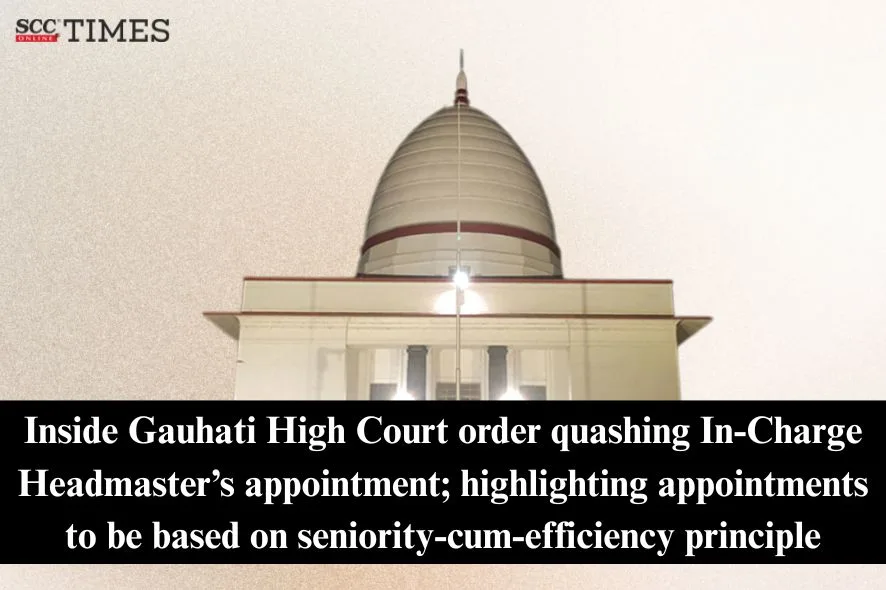Gauhati High Court: In a petition filed by the petitioner under Article 226 of the Constitution, challenging the order issued by the District Elementary Education Officer (‘DEEO’), whereby Respondent 5 was allowed to act as In-Charge Head Master cum Member Secretary, Robin Phukan J., stated that appointment of In-Charge Headmaster had to be made on the principle of seniority-cum-efficiency. Thus, the Court quashed the impugned order and directed the respondent authorities to allow the petitioner to hold the post of In-Charge Headmaster cum Member Secretary with all financial powers of the school, in addition to his normal duties, until a regular Headmaster was posted in the said school.
Background:
On 10-2-1994, the petitioner was initially appointed as Science Graduate Teacher, under Block Elementary Education Officer (‘BEEO’), Mankachar in a school. Thereafter, on 11-2-1994 he joined in the said school at 09:45 a.m. Respondent 5, Hindi Teacher, joined on the same date i.e. 11-2-1994 at 10:00 a.m. However, nowhere in the said seniority list, was the time of their joining mentioned. The petitioner’s date of birth was shown as 24-1-1968, whereas Respondent 5’s date of birth was shown as 27-11-1972. Thereafter, petitioner was transferred to different schools on different occasions. Later his transfer order was kept in abeyance until further orders, and he was directed to join in his earlier school.
The petitioner challenged the joining report of Respondent 5 as In-Charge Headmaster cum Member Secretary of the said school, and also challenged the seniority list of teaching and non-teaching staffs prepared by the earlier Headmaster illegally, alleging that it was to deprive him from holding the post of In-Charge Headmaster cum Member Secretary.
The Respondent contended that the School Management Committee, as well as the guardians and students at the school, filed a public complaint against the petitioner before the District Commissioner and prayed for not allowing him to join in the school. It was further contended that there were three separate seniority lists of teaching and non-teaching staffs, which were forwarded by the Headmaster to the office of the DEEO on different occasions and in all the said lists, the name of the petitioner appeared after the present In-Charge Headmaster.
Analysis, Law, and Decision
Considering the applicability of Notification dated 2-3-2010, which mandates selection to Headmaster posts on the basis of seniority-cum-efficiency, the Court observed that the notification was silent regarding appointment of In-Charge Headmaster. However, since selection to the post of regular Headmaster, as per Clause 3 of the said Notification, shall be made strictly based on seniority-cum-efficiency, the appointment of an In-Charge Headmaster must also be made on the same principle of seniority- cum-efficiency. In support of this view, the Court relied on the decision of Gauhati High Court in Ashok Kumar Roy v. State of Assam, WP(C) No. 5870 of 2007 dated 10-1-2008, wherein it was held that the prime consideration for choosing an incumbent to be in-charge Headmaster/Headmistress of a school was the school seniority.
The Court also relied on D.P. Das v. Union of India, (2011) 8 SCC 115, wherein it was held that for the determination of seniority among incumbents recommended on the same date, age was the only valid and fair basis, and accordingly, their seniority should be decided. In the present case, based on the date of birth, the petitioner was senior to Respondent 5 by 4 years 10 months 3 days, as per the seniority list.
Although both the petitioner and Respondent 5 joined on the same date, based on their time of joining and respective dates of birth, it was found that the petitioner was senior to Respondent 5. Hence, the seniority list prepared by the headmaster and countersigned by the BEEO was found to be illegal, arbitrary and liable to be interfered with. The Court stated that being the senior-most teacher at the school, the petitioner was entitled to hold the post of In-Charge Headmaster, even though the same was an ad-hoc arrangement.
The Court relied on Somesh Tiwari v. Union of India, (2009) 2 SCC 592, wherein it was held that a transfer order, when passed without giving an opportunity of being heard to the officer concerned was malice in law, and such a transfer order, when passed in lieu of punishment, was wholly illegal and liable to be set aside. The Court held that the petitioner was eligible to hold the post of In-Charge Headmaster, as no disciplinary proceeding was initiated against him, no show cause notice was issued in relation to complaints lodged, and no opportunity of being heard was afforded to him prior to passing the impugned transfer order.
Thus, the Court quashed and set aside the order passed by the respondent authorities allowing Respondent 5 to act as In-Charge Headmaster cum Member Secretary. The seniority list enclosed with the petition being irrational and illegal, was also set aside and quashed. The respondent authorities were directed to allow the petitioner to hold the post of In-Charge Headmaster cum Member Secretary with all financial powers of the school, in addition to his normal duties till regular Headmaster was posted in the said school.
[Nozrul Islam v. State of Assam, 2025 SCC OnLine Gau 3346, decided on 20-6-2025]
Advocates who appeared in this case:
For the Petitioner: N Shama, G U Ahmed, R Islam, Advocates
For the Respondent: J Abedin, S C Biswas, Advocates



